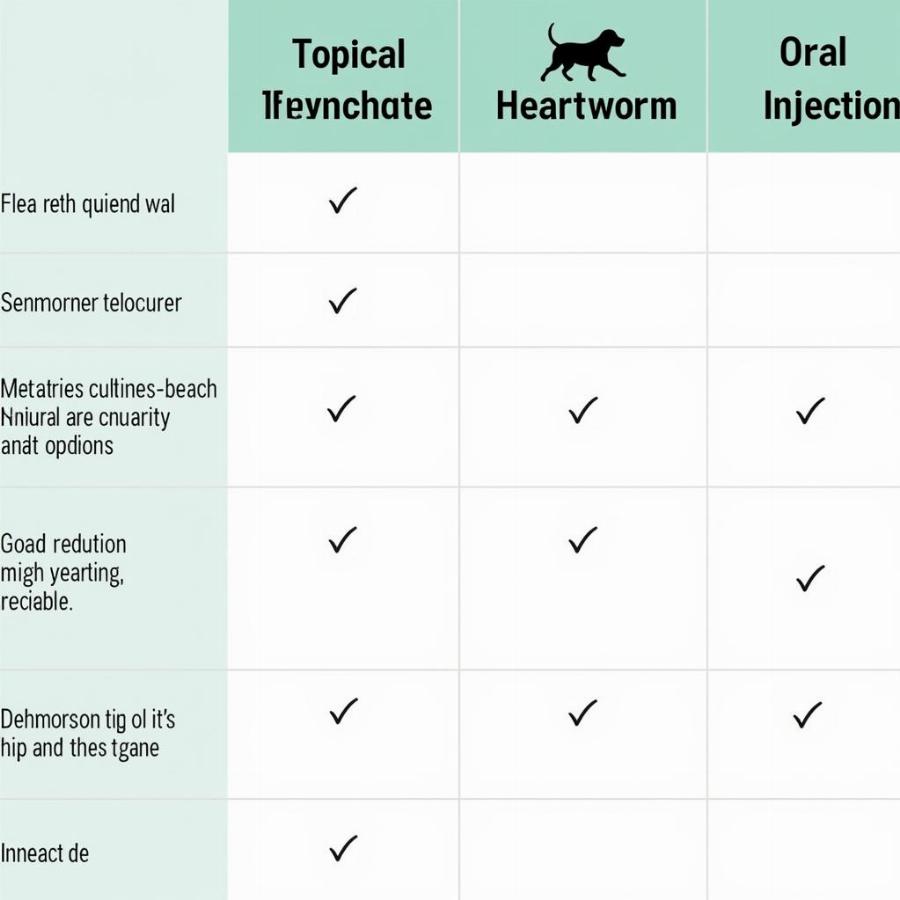Flea and heartworm control for dogs is crucial for maintaining their health and happiness. These parasites can cause a range of problems, from simple skin irritation to life-threatening illnesses. Understanding the risks and implementing effective preventative measures is essential for every responsible dog owner. This comprehensive guide will delve into the importance of flea and heartworm prevention, exploring various treatment options and offering practical advice to keep your furry friend parasite-free.
Understanding the Threats: Fleas and Heartworms
Fleas are tiny, wingless insects that feed on the blood of mammals, including our beloved canine companions. While their bites can cause itching and discomfort, they can also transmit diseases and lead to more serious complications like flea allergy dermatitis. Heartworms, on the other hand, are parasitic worms that live in the heart and pulmonary arteries of dogs, transmitted through mosquito bites. Heartworm disease can be debilitating and even fatal if left untreated.
Why Flea and Heartworm Prevention is Essential
Preventing these parasites is much easier, and less expensive, than treating an infestation or infection. Regular preventative measures protect your dog’s health, prevent discomfort, and safeguard your home from parasite infestations.
Choosing the Right Flea and Heartworm Prevention for Your Dog
There are numerous flea and heartworm preventatives available, each with its own pros and cons. The best choice for your dog will depend on their age, breed, lifestyle, and any existing health conditions.
Topical Treatments
Topical treatments are applied directly to your dog’s skin, typically on the back of the neck. These products usually kill adult fleas and prevent flea eggs and larvae from developing. Some topical treatments also offer protection against ticks and other parasites.
Oral Medications
Oral medications are typically given monthly and are highly effective in preventing heartworm disease. Many oral preventatives also offer flea and tick control.
What about Natural Remedies?
While some natural remedies may offer some level of protection, they are often not as effective as conventional treatments. It’s important to discuss any natural remedies with your veterinarian before using them on your dog.
 Comparison of Flea and Heartworm Treatment Options for Dogs
Comparison of Flea and Heartworm Treatment Options for Dogs
Creating a Flea and Heartworm Prevention Plan
A comprehensive flea and heartworm prevention plan involves more than just administering medication. Regular grooming, cleaning your home, and checking your dog for parasites are also important steps.
Year-Round Protection
Fleas and heartworms can be a problem year-round, even in colder climates. Maintaining year-round protection is crucial for preventing infestations and infections.
Consult Your Veterinarian
Your veterinarian is the best resource for determining the right flea and heartworm prevention plan for your dog. They can recommend the most effective products and help you develop a tailored approach based on your dog’s individual needs.
FAQ: Common Questions about Flea and Heartworm Control
Q: How often should I give my dog flea and heartworm medication?
A: Most flea and heartworm preventatives are given monthly.
Q: Can I use cat flea and heartworm medication on my dog?
A: No, never use cat flea and heartworm medication on a dog. Certain ingredients in cat medications can be toxic to dogs.
Q: What are the signs of heartworm disease in dogs?
A: Signs of heartworm disease can include coughing, fatigue, difficulty breathing, and weight loss.
Q: Are there any side effects of flea and heartworm medications?
A: Some dogs may experience mild side effects such as temporary skin irritation or gastrointestinal upset.
Q: What should I do if I miss a dose of flea and heartworm medication?
A: Contact your veterinarian for guidance on what to do if you miss a dose.
Q: How can I tell if my dog has fleas?
A: Signs of fleas include excessive scratching, biting, and hair loss. You may also see small, dark specks (flea dirt) on your dog’s skin.
Q: Is heartworm disease contagious?
A: Heartworm disease is not contagious from dog to dog. It is transmitted through mosquito bites.
Conclusion
Flea and heartworm control for dogs is a vital part of responsible pet ownership. By understanding the risks, choosing the right preventative measures, and working closely with your veterinarian, you can protect your furry companion from these harmful parasites and ensure they live a long, healthy, and happy life.
Related articles you might find helpful:
- flea and tick and heartworm control for dogs
- parasites on dogs
- nexgard plus for dogs
- insect spray for dogs
Beaut Dogs is your trusted source for comprehensive and reliable information on the world of dog breeds, from the familiar to the rare and exotic. We offer expert advice on dog care, health, training, and nutrition, empowering you to provide the best possible care for your beloved canine companion. When you need assistance, contact us at Email: [email protected] to get detailed and accurate answers from Beaut Dogs. Visit us at https://beautdogs.com to delve into the fascinating world of dog breeds and learn how to care for them.